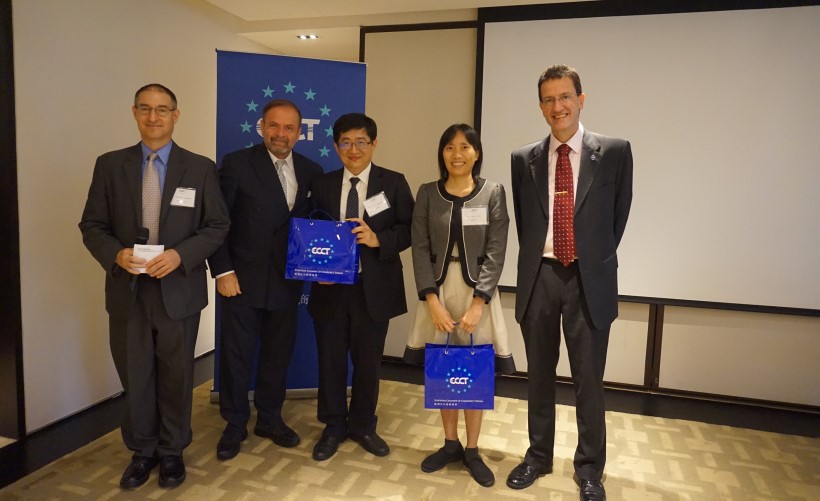First ECCT lunch on planet-friendly eating

The ECCT held its inaugural Planet-Friendly Eating and Living (PEL) Platform lunch on the subject "Why the World Needs a New Diet - How plant-based food is good for the planet and your health". It was the first event held under the platform to promote eating and living habits that have lowest environmental impact and the highest health benefits. The event featured a healthy, gourmet, planet-friendly menu prepared by the Grand Hyatt Taipei’s Michelin-starred chefs and presentations by renowned medical experts on the environmental and health benefits of a plant-based diet. In order to ensure the lowest possible environmental impact, Hyatt chefs designed and prepared a menu that was 100% plant-based, organic and mostly locally-sourced. In addition, ingredients were carefully chosen based on their nutritional value and health benefits. At the event, presentations were given by Dr Lin Ming-Nan, the Vice Superintendent and Director of Family Medicine at Dalin Tzu Chi Hospital in Chiayi County, Tzu Chi Medical Foundation and Dr Tina Chiu, Assistant Professor in the Department of Nutritional Science at Fu Jen Catholic University.
The latest ECCT initiative builds on the success of the ECCT’s Low Carbon Initiative. As ECCT CEO Freddie Höglund explained in his opening remarks at the lunch, “We have known for many years that the world is on an unsustainable path. Human activity is destroying the planet and using up resources faster than nature can replace them. Through our Low Carbon Initiative, the ECCT has been advocating the drive towards eventual decarbonisation of business and industry activities across all sectors. We have also been strongly advocating an energy transition away from fossil fuels toward renewables. But up until now, we have not paid much attention to the impact of how our dietary choices are impacting our health and the planet. This is why we set up the PEL platform”.
In response to the need for global food security and sustainability solutions, the mission of the PEL Platform is to help corporations and individuals make informed choices regarding their health and also the health of the planet by sharing information and raising awareness about nutrition, healthy lifestyles and choices and ways to mitigate the impact of human agricultural and food-related activities on the environment.
Under the PEL Platform, the ECCT will actively promote planet-friendly diets, exercise and living habits that maintain and enhance the health of people and safeguard the environment by minimising the impact of humans and restoring ecological balance. Under the platform, activities will be arranged that highlight innovative research, environmental, social and business trends and showcase the best solutions and practices for: Producing and distributing nutritious food that has the lowest possible impact on the environment; Enhancing physical and mental health and well-being by promoting healthy lifestyle choices and Promoting sustainable, planet-friendly consumption habits.
The world’s population is expected to surge to 9.6 billion by 2050, leading to a 61% increase in food production. Conventional meat production is one of the biggest drivers of climate change as well as being responsible for significant water usage and environmental pollution. Consumption of meat globally has doubled in the past 20 years and, based on current trends, is expected to double again by 2050, accounting for an even larger proportion of emissions (given reductions by other sectors). Meanwhile, unhealthy diets lacking in plant-based nutrients are responsible for 11 million preventable deaths globally per year, which is more than smoking tobacco. At the event, speakers cited scientific research to show how switching to a plant-based diet would significantly reduce the environmental impact of humans on the planet while a whole-foods, plant-based diet would also help to maintain and promote human health.
In his presentation, Dr Lin said that around 10% of Taiwanese are vegetarians, mostly ovo-lacto vegetarians (who eat eggs and dairy products). He went on to explain that, while humans are able to eat meat, based on their teeth and digestive systems, they have evolved to eat a mostly plant-based diet.
An omnivorous diet requires something like 2.9 times more water and 2.5 times more primary energy to produce than a plant-based diet. Climate change will make it more difficult to produce food. According to a study cited by Lin, a global rise in temperature of 2˚ Celsius would result in a drop in maize production of more than 10% in many countries, while a rise of 4˚ Celsius could cut production by over 40% in the United States. Moreover, food produced under higher temperatures would also reduce the nutritional value of food.
Citing statistics by Greenpeace, Lin said that cattle rearing is responsible for 70% of the degradation of the Amazon rainforest, putting at risk 40,000 plant species, 427 mammal, 1,294 bird, 378 reptile, 427 amphibian and 3,000 fish species, 200,000 indigenous people from 180 ethnic groups. This is a disproportionately large impact on the environment given that livestock only accounts for about 1.5% of the global economy.
Dr Tina Chiu cited research on the benefits of a plant-based diet. Given that animal products are projected to be responsible for the largest portion greenhouse gas emissions, adopting a plant-based diet is one of the three main options for keeping the global food system within environmental limits, in conjunction with reducing food waste and improving agricultural technology and systems.
Citing a study in Lancet, Chiu said that a combination of agricultural technological improvements and a 30% reduction in livestock production would be needed to meet the emission reduction targets. Moreover, in terms of health, reduced consumption of livestock products is estimated to reduce the burden of ischemic heart disease by 15% in the UK and 16% in Sao Paulo city.
Regarding the claim that animal products are the best source of protein, Dr Chiu said that this was a simplistic notion based on a misunderstanding of human nutrition, because humans require a much larger variety of nutrients than just protein. She said that it was easy to get enough protein from plants, which also provide a variety of other nutrients that the body needs and are lacking in animal products.
She went on to cite a number of studies which show that a plant-based diet reduces the risks of heart disease, type 2 diabetes, hypertension, certain types of cancer and obesity. She cited a study which showed that high animal protein was positively associated with mortality while high plant protein intake was inversely associated with mortality.
A plant-based diet also lowers the risk of type 2 diabetes, although Dr Chiu stressed that not all plants are created equal. For example, consuming too much fruit juice, sweetened beverages, refined grains, potatoes, sweets and desserts are not healthy. Instead, a healthy diet should be rich in whole grains, fruits, vegetables, nuts and legumes.
Dr Chiu’s own studies of Taiwanese subjects back up the findings that a plant-based diet may protect against diabetes, regardless of a person’s body mass index. Another study Dr Chiu was a part of, showed that non-vegetarians with hypercholesterolemia had 3.8 times the risk of gallstone disease compared to vegetarians. Another of her studies showed that a vegetarian diet lowers the risk of gout and a diet with a high soy content is safe, disproving a belief held by 48% of health professionals in Asia that soy causes gout.
She concluded by pointing out that that there are many innovative new plant-based business solutions being developed. For example, to cater to the common problem of a lack of vitamin B12 in the diets of pure vegans, an innovative company has developed a kind of toothpaste that is fortified with vitamin B12 and is absorbed in the oral cavity when users are brushing their teeth. Vegans, the elderly, or other people with vitamin B12 deficiency just need to brush their teeth twice a day to give them sufficient B12.

